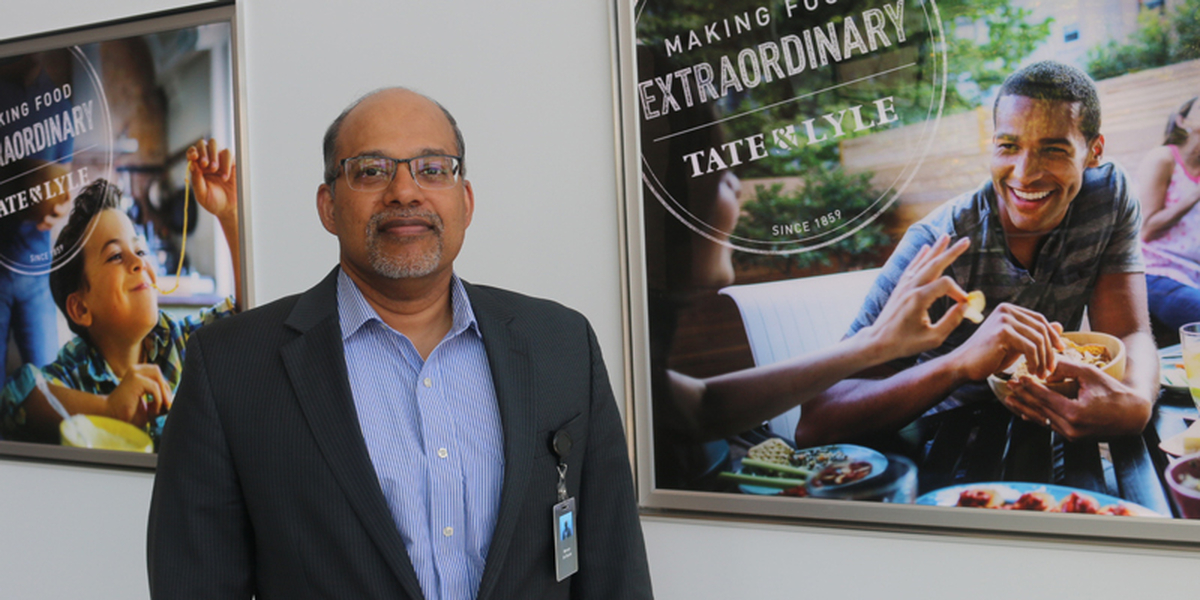
Mervyn de Souza (M.S. Microbial Engineering, ’97 and Ph.D. Biochemistry Molecular Biology and Biophysics, ’98) spends his days just outside Chicago running research and development at Tate & Lyle. But his time in Minnesota is deeply imprinted in more ways than one. He and his partner — fellow CBS alum Jennifer Seffernick (Ph.D. Biochemistry Molecular Biology and Biophysics, ’01) — met as graduate students in the lab of Larry Wackett (de Souza was co-advised by Mike Sadowsky), and have been together ever since. They return to Minnesota with their children each summer for a visit to the North Shore and the St. Paul campus.
De Souza recalls an insight shared by his then-advisor who told him “life is a marathon, not a sprint.” With that in mind, he’s made it a point to explore opportunities outside his comfort zone from working on specialty canola oil hybrids to bionutrients for the fermentation industry. All of those experiences led him to where he is today. Says de Souza: “I find myself using learnings from my various experiences to impact innovation and commercial development at Tate & Lyle. We asked him to talk about his work, what he’s most proud of and his advice for students and recent alums.
Describe a typical day in your role as VP of Global R&D at Tate & Lyle. What aspects of your job do you enjoy most?
What I enjoy about my current role is that no two days are exactly the same and the fact that I get to work with an amazingly talented group of people developing novel food ingredient solutions. I really love that I can go to the grocery store with my family and watch them pick up products that use our Tate & Lyle ingredient solutions to create reduced sugar and calorie products that taste terrific. As a consumer myself, it’s great to benefit personally from the research that we do.
You’ve launched your own business, held high-level leadership roles and received multiple patents for your work. What are you most proud of and why?
I have had opportunities to grow both professionally and personally through various career progressions, and I have had some amazing mentors and coaches. I wouldn’t trade any of those experiences. It’s been a privilege to be able to look back on teams that I have built and been a part of, as well as technical solutions that we have commercialized. I have learned that great teams can make the impossible possible, and that’s powerful. Seeing products on the market that I had a hand in developing makes me both proud and grateful for the opportunities I have had. However, I am most proud of my kids who teach me something new every day and my wife who is the glue that holds our family together when she is not teaching chemistry.
You have held leadership roles in biotechnology for two decades. What do you see as the most important changes you’ve observed in that time?
Time flies when you are having fun! There have been some amazing advances in the field of biotechnology over the past two decades. I won’t even attempt to enumerate those. Suffice to say that many ceilings have been broken through and some of the most interesting discoveries are being made at the intersection of disciplines. But what stands out to me is what has remained the same and that is the passion to make a difference against all odds and the creative ways people find to do this! This is especially the case in the food industry with increasing pressure on food companies to innovate while managing costs. For that reason, the role biotechnology plays in delivering solutions is on the rise with exciting developments on the horizon.
What advice do you have for students and recent grads interested in biotechnology careers?
Biotechnology is a field with so many possibilities. I can’t think of a more exciting career with the opportunity to make a difference. My advice to those who have the good fortune to be in this space would be to make sure to take some of the detours along the way because you never know what might be around the bend.